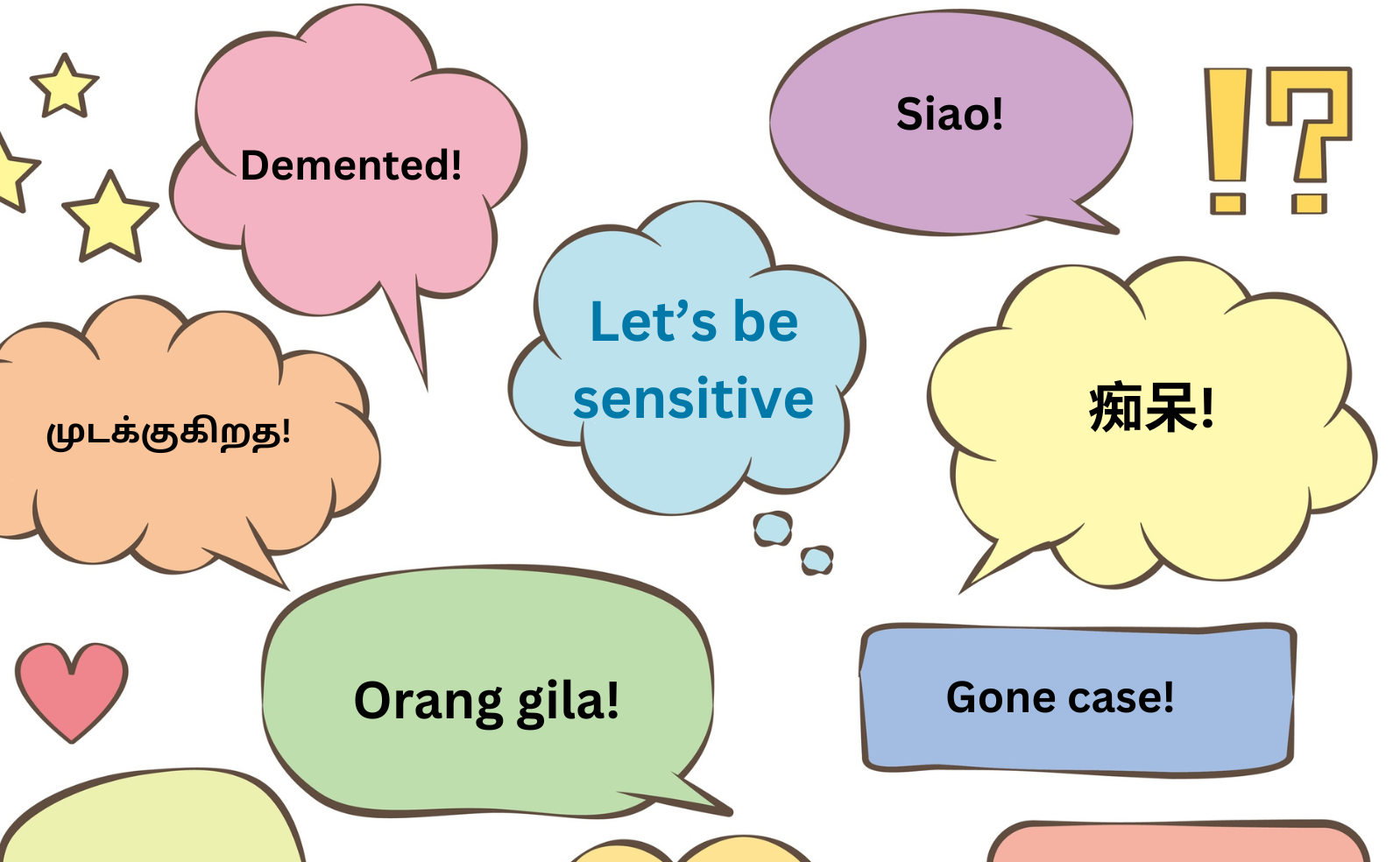Using the right language consistently when talking about dementia or people living with dementia can go a long way in combatting negative societal attitudes and creating a truly inclusive society. Recognising this, Dementia Australia released a set of language guidelines in 2018. Since then, a growing number of organisations and social service agencies have advocated for the use of person-centred language when talking about people who live with dementia. However, perhaps due to insufficient public awareness or the inconvenience involved in using longer terms, adoption of person-centred language is still limited.
Why does using person-centred language matter?
Language use has a significant impact on not just the way others view or treat people living with dementia, but also how people living with dementia perceive themselves and their relation to others. Many terms used to describe dementia and people with a dementia diagnosis are based on outdated or inaccurate understanding of the disease.
Common stigmatising local terms associated with dementia
Language frames our understanding of dementia as a disease and its root causes. Frequently using terms that describe its causes incorrectly or ascribe blame creates bias, which also fuels stigma. Cultural stigma is a set of “negative beliefs, prejudices and discriminatory structures” shared by a society (Link et al., 2001). The perception of dementia as something that needs to be hidden affects a person’s willingness to seek diagnosis, which limits their access to care options and support. This is concerning because early diagnosis and treatment can greatly improve outcomes for dementia.
People living with dementia may internalise stigma about their condition, which affects their self-esteem and well-being. This can cause them to withdraw from social interaction, which worsens dementia progression. Instead, using person-centred language encourages agency for persons living with dementia to manage their condition.
Stigmatising imagery used in the portrayal of dementia
A large-scale thematic analysis of books, films, television programmes, social media, and news items, conducted in December 2017 and updated in January 2019, revealed several common themes in depictions of dementia that may perpetuate cultural stigma.
There is often an emphasis on the biomedical framing of the disease and brain deterioration, compared to a holistic view of how dementia changes the lived experience of the person. The address “person living with dementia” is preferable to “Alzheimer’s patient” because dementia is a long-term condition. It is more helpful to focus on living well with dementia after their diagnosis than focusing on their status as a patient, since there is currently no known cure for dementia.
Dementia is also often likened to a natural disaster or epidemic, using metaphors like “rising tide” and other apocalyptic terms. This enforces the view that dementia should be feared and that people living with dementia are passive victims of the condition, when in fact progression can be prevented with social interaction and cognitive engagement. The term “epidemic” also implies that dementia is contagious, which encourages misperception of dementia and avoidance of persons living with dementia.
This not only causes undue public fear of persons living with dementia, but it also ascribes blame to the person and undermines public awareness efforts of dementia prevention.
Other terms often used include “victims” or “sufferers”. These terms limit our view of people living with dementia to that of requiring pity or compassion, rather than being able to contribute meaningfully. Images used to depict dementia often portray persons with dementia as an ‘empty shell’ or as a disembodied set of hands, which dehumanises the person living with dementia and decreases emotional connection to them.
In a survey of persons living with mild dementia, 46% were reluctant to share their diagnosis because of concerns that they would be “talked about like they were not there” (Burgener and Buckwalter, 2018). When people do not understand dementia, they are more likely to exclude persons living with dementia from conversations and instead speak directly only to caregivers. Hence, we can expect that increasing public awareness will increase the inclusion of people living with dementia. 65% of visitors to the “People of Dementia” blog, which published personal stories of people living with dementia and how life was like for them before and after the diagnosis, agreed that they felt more comfortable interacting with persons living with dementia after reading the blog (Jamieson et al., 2017).
Terms to Avoid | Preferred Terms | Why this term needs to be avoided and changed |
Orang gila (“crazy person” in Malay) | Orang yang menghidapi demensia | Dementia is not a form of psychosis, although some forms of dementia may cause people to experience hallucinations. |
Demented | Living with dementia | |
Gone case | Changed behaviours | It implies that the person living with dementia is beyond help, when symptoms can actually be managed with care. |
Menggila (“out of control” in Malay) | Expressing unmet needs | Behavioural symptoms can often result from an inability to express unmet needs. |
unpredictable | ||
siao (“acting crazy” in Mandarin) | ||
Senile | Diagnosed with dementia | This term inaccurately implies that dementia is because of old age. |
痴呆症 (a derogatory term use to describe dementia in Mandarin) | Dementia | This term implies that people living with dementia are unintelligent and absent-minded. Especially in the early stage of dementia, disorientation is an occasional state rather than a characteristic. |
How do we use appropriate language when referring to persons living with dementia?
Language used about persons living with dementia should be clear, normal, jargon-free, inclusive, and centred on the person, not the disease. In addition, language can be made more dementia-inclusive by:
- Using first-person language
- Eliminating pejorative terms that have negative connotations
- Choosing inclusive language – acknowledging someone’s circumstances, but avoiding disempowering narratives (e.g. uses a wheelchair vs. wheelchair-bound)
- Avoiding labels
- Avoid leading with social identifiers (e.g. race or language)
- Avoiding language that attributes responsibility to persons for their condition
- Avoiding verbs that undermine the person’s experience of the disease
(Adapted from Healy et al., 2022)
In the long term, using person-centred language instead of stigmatising language will correct public perception of dementia and reinforce that persons living with dementia should be treated with respect. This includes their inclusion in medical discussions, designing care treatment plans and programmes, and co-participation in research.
Being mindful of the words and imagery we use to talk about dementia and people with dementia, is one of the most important steps we can take as individuals to build a dementia-inclusive society.
Additional Resource
Dementia Language Guidebook
Dementia Singapore and the Lien Foundation collaborated to produce a dementia language guidebook titled Changing Words, Touching Lives, which was inspired by Dementia Australia’s Dementia Language Guidelines. It lists the preferred words and phrases for describing dementia in Singapore’s context, as well as terms to avoid which are applicable in all situations. This ranges from casual conversation to publicity materials relating to dementia as a disease and persons living with dementia.
- Healy, M., Richard, A., & Kidia, K. (2022). How to Reduce Stigma and Bias in Clinical Communication: a Narrative Review. Journal of general internal medicine, 37(10), 2533–2540. https://doi.org/10.1007/s11606-022-07609-y
- Dementia Australia. (2018). Dementia language guidelines. https://www.dementia.org.au/media/2018-dementia-language-guidelines
- Lien Foundation. (2018). Changing words, touching lives: A guide to dementia-inclusive language.
- Swaffer, K. (2014). Dementia: Stigma, language, and dementia-friendly. Dementia: The International Journal of Social Research and Practice, 13(6), 709–716. https://doi.org/10.1177/1471301214548143
- Tan, W. J., Hong, S. I., Luo, N., Lo, T. J., & Yap, P. (2012). The Lay Public’s Understanding and Perception of Dementia in a Developed Asian Nation. Dementia and geriatric cognitive disorders extra, 2(1), 433–444. https://doi.org/10.1159/000343079
- Dementia Australia. (2018). Dementia language guidelines. https://www.dementia.org.au/media/2018-dementia-language-guidelines
- Young, J. A., Lind, C., Orange, J. B., & Savundranayagam, M. Y. (2019). Expanding current understandings of epistemic injustice and dementia: Learning from stigma theory. Journal of Aging Studies, 48, 76–84. https://doi.org/10.1016/j.jaging.2019.01.003
- Low, L. F., & Purwaningrum, F. (2020). Negative stereotypes, fear and social distance: A systematic review of depictions of dementia in popular culture in the context of stigma. BMC Geriatrics, 20(1), 477. https://doi.org/10.1186/s12877-020-01754-xresearchgate.net+6




